A quick screenshot with the point of interest:
There are 2 questions here.
This happens in a tight loop. The 12.8% code is this:
{
this with Side = side; PositionPrice = position'; StopLossPrice = sl'; TakeProfitPrice = tp'; Volume = this.Volume + this.Quantity * position'
}
This object is passed around a lot and has 23 fields so it's not tiny. It looks like immutability is great for stable code, but it's horrible for performance.
Since this recursive loop is run in parallel, I need to store it's context variables in an object.
I am looking for a general idea of what makes sense, not something specific to that code because I have a few tight loops with a bunch of math which I need to profile as well. I am sure I'll find the same pattern in several places.
The flaw here is that I store both the context for the calculations and its variables in a singe type that gets passed in the loop. As the variable fields get updated, the whole object has to be recreated.
What would make sense here (in general for this type of situations)?
- make the fields that can change mutable. In this case, that means keeping the type as is (23 fields) and make some fields mutable (only 5 fields get regularly changed)
- move the mutable fields to their own type to have a general context object and one holding all the variables. In this case, that means having a context with (23 - 5 fields) and a separate 5 fields type
- make the mutable fields variables and move them out of the type. In this case, these 5 fields would be passed as variables in the recursive loop?
and for the second question:
I have no idea what the 10.0% line with get_Tag is. I have nothing called 'Tag' in the code, so I assume that's a dotnet internal thing. I have a type called Side and there is a field with the same name used in the loop, but what is the 'Tag' part?

